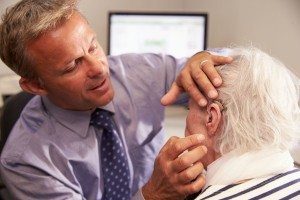Hearing Loss in the Elderly
Elderly Care in East Quogue NY
As people age, almost inevitably, they begin to lose their hearing. Sadly, however, most older adults don’t recognize the symptoms of hearing loss, even when in elderly care. There are some
First of all, while there are certainly times when talking on the phone can be difficult for all parties, do you notice that your elderly family member seems to struggling to hear on a regular or even semi regular basis? Are they saying, “What?” constantly, and do you find yourself having to repeat yourself multiple times and raising your voice so they can hear you? What about in person? How about their volume controls? If you call them and can hear the volume of the television, how loud does it seem to you over the phone? Or when you go and visit?
The fact is that between the costs of hearing aids, the perceived stigma of using them, and the preconceived notion that they will feel uncomfortable, many elderly people simply refuse to consider the possibility. Others do not recognize that their inability to hear and perceive what is being said is not normal, especially if they are living alone and not spending great amounts of time involved with others. They have no basis for comparison if their television is, in order for them to hear it, blastingly loud. So the conversation often has to begin with a family member or friend speaking up.
Once the problem is recognized, the first thing to do is to talk to the doctor. He or she may recommend that the elderly person be seen by an ear, nose and throat specialist (an otolaryngologist), or perhaps send them directly to a hearing specialist (and audiologist) for evaluation. There are even retail store environments that now offer hearing evaluations and hearing aid products.
Once your elderly family member has been evaluated, there are a variety of options to help him or her. Building up lip-reading skills may be an inexpensive and very productive first step, but that will only help her when she is present with someone. Beyond that, there are some assistive technology aids that amplify sounds. They may be incorporated into a telephone or cellphone or there are apps that can be downloaded to help with this as well. Finally, there are cochlear implants and hearing aids. For more information on hearing loss and the various types of hearing aids available, visit NIH at http://www.nidcd.nih.gov/health/hearing/Pages/older.aspx.
If you or an aging loved one are considering hiring professional elderly care services in East Quogue, NY, call the caring staff at Artful Home Care today at 631-685-5001.
- The Hidden Safety Benefits of an Organized Home - April 3, 2025
- Artful Home Care Presents Planning Your Legacy: An End-of-Life Strategy Session - March 27, 2025
- Celebrate National Garden Month with Your Senior - March 19, 2025

